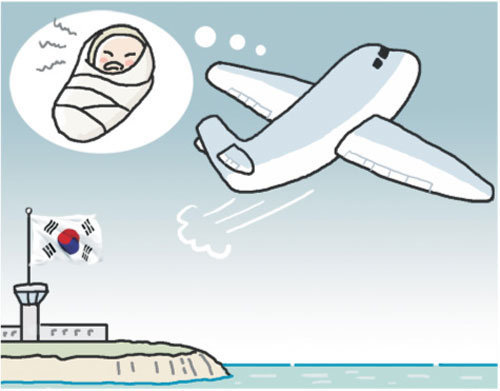Abandoned kids from Aerok
Abandoned kids from Aerok
Posted July. 07, 2021 07:16,
Updated July. 07, 2021 07:16

Reading a poem is sometimes an experience of facing an uncomfortable truth. South Korean poet Kim Hye-soon’s “KAL” provides such an experience. The poem describes the story of siblings who lived apart from each other. “Father went missing and mother got married. The eldest daughter was sent to Busan, the son to France, and the younger daughter to the U.S.” The story of three siblings who need three-way interpretation to communicate. There were four, but the whereabouts of the youngest are unknown. The absence of the youngest who was one year old at the time of their separation hit the three siblings embracing each other at an airport. “The youngest still hasn’t been found. Three of us embraced each other first at the airport.” The word ‘first’ reminds them that their embrace is incomplete until the youngest joins the group.
Their parents are partially to blame for their separation, but the poet puts bigger responsibility on the country. “Why did Aerok send a seven-year-old, a three-year-old, and a one-year-old to foreign countries and have them crawl on the cement floor like slugs? Why did it let them shiver like frozen leaves of a cabbage on the ground of an outdoor market?” Aerok is the backward pronunciation of Korea. The one who sent the three kids to foreign countries was Aerok or South Korean society. Aerok is a “shameful country” for sending countless children overseas.
The three siblings met together again for the first time after they became adults. Two of them returned to their countries with only the eldest daughter left in South Korea. “As the planes fly into the distance carrying younger siblings, the eldest daughter left alone cried.” “Aerok’s hypocrisy was left as tissue papers in the bathroom of the airport,” the poet turns to readers. “Have you been on an airplane with babies heading to foreign countries? Have you been on vacation listening to their crying sound?” the poet urges readers to imagine themselves in an airplane with babies for overseas adoption. The poem makes us feel uncomfortable. We may be willing to bear the uncomfortableness perhaps because of the awareness that we might have contributed to sending kids away for adoption.
Headline News
- Joint investigation headquarters asks Yoon to appear at the investigation office
- KDIC colonel: Cable ties and hoods to control NEC staff were prepared
- Results of real estate development diverged by accessibility to Gangnam
- New budget proposal reflecting Trump’s demand rejected
- Son Heung-min scores winning corner kick







